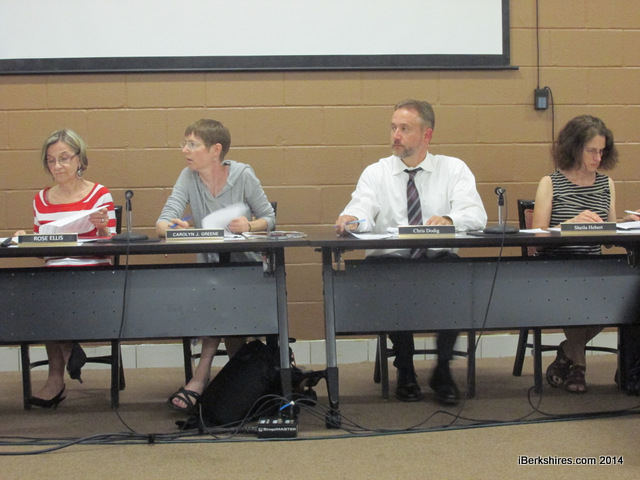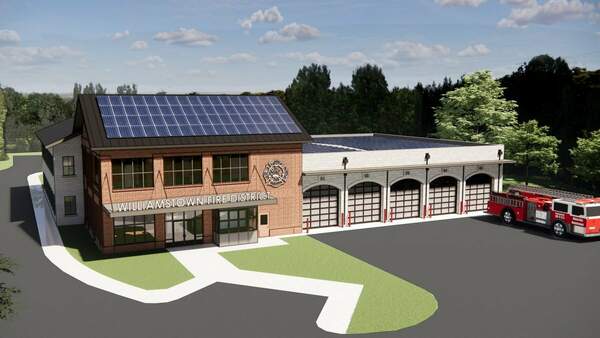Williamstown Elementary Says No to PARCC Test, Mount Greylock Weighs Option
|
The Mount Greylock School Committee on Tuesday decided to hold off on making a final decision about changing standardized tests, while the Williamstown Elementary School Committee on Wednesday decided not to change tests next year. |
WILLIAMSTOWN, Mass. -- The Williamstown Elementary School Committee has decided not to accept the commonwealth's offer to try out a new standardized test.
The Department of Elementary and Secondary Education is in the middle of a two-year trial run for the Partnership for Assessment of Readiness for Colleges and Careers (PARCC) exam, a national exam that could eventually replace the well-established Massachusetts Comprehensive Assessment Systems (MCAS) testing.
DESE administered the PARCC exam in selected districts this spring and offered all districts the opportunity to use it in the 2014-15 academic year with the incentive that districts will not be penalized for poor performance on the experimental exam.
The Mount Greylock Regional School Committee also has discussed the possibility of going to PARCC but has decided to hold off on making a final decision.
Superintendent Rose Ellis advised the WES Committee that there was too much uncertainty surrounding the future prospects for PARCC to recommend implementation next year.
"The other concern I found out yesterday is [the state] may not adopt it anyway," Ellis told the elementary school panel on Wednesday. "They may just throw it out. I think Florida threw it out and developed its own."
PARCC is a national exam that is designed to align with the national Common Core standards, which Massachusetts has been implementing for several years. Another advantage of PARCC is that it allows for online test taking, although in next year's trial phase, the exam would have a pencil and paper option, Ellis told the Mount Greylock committee at its meeting on Tuesday.
At both meetings, Ellis indicated that the "Tri-District" schools -- WES, Mount Greylock and Lanesborough Elementary -- were aware of the possibility of a transition to PARCC but were not prepared to make the leap as soon as next year.
"Then we heard conversations about, 'Well, they're holding you harmless, and it's just a practice,' " Ellis said at the WES meeting, which was telecast on the town's community access television station, WilliNet.
Ellis also noted at both meetings that the three schools she serves as superintendent are rated either Level 1 or Level 2 according to their MCAS results. The idea of getting a "freebie" from the state by trying PARCC might be more appealing to Level 3 or Level 4 schools, she said.
"We do very well well anyway, and this will channel our energies in a way we're not prepared for," Ellis told the WES Committee.
Perhaps as important to her recommendation is the relatively new impression she had that PARCC is not an inevitability.
On Tuesday at the Mount Greylock meeting, she told the committee, "The state has been telling us, 'They're coming. Get ready.' "
Twenty-four hours later, she was talking about the prospect of PARCC being "thrown out," an idea that was supported by research conducted by a member of the WES Committee.
"There's a competing faction," Dan Caplinger said, perhaps referring to the Smarter Balanced Assessment Consortium, which lists Vermont, New Hampshire, Connecticut and Maine among its governing states.
"It's sort of like the SAT and the ACT. Eventually you might have some resolution in that direction. ... It seems far less certain the state will move forward with this."
Unlike the WES Committee meeting, where a brief discussion focused mostly on the question of whether to move early to a test that may or may not be the standard in the commonwealth down the road, the Mount Greylock School Committee held a protracted discussion about the merits of the PARCC exam.
Committee member David Langston strongly espoused the merits of PARCC, which he characterized as vastly superior to the MCAS exam.
“I’ve always despised MCAS because of its deleterious effects on the educational process,” Langston said.
“PARCC is more linked to Common Core goals … so outcomes assessments have some kind of flexibility and robust goals toward which to move. MCAS goals I consider trivial and even retrograde for public education.”
Langston told the committee that was familiar with PARCC through his work as the Massachusetts College of Liberal Arts’ representative to the PARCC working group in Massachusetts.
“In terms of the integrity of the educational goal, PARCC is better,” he said.
Mount Greylock School Committee member Robert Ericson asked whether the junior-senior high school would need to add computer terminals in order to accommodate online testing under PARCC. Ellis told him that would not be a concern in the short term as there will be a paper option for the next few years.
Mount Greylock Principal Mary MacDonald said she and Ellis were in agreement that the school would stay with paper and pencil tests for the near future regardless of the logistical concerns.
“You can’t suggest students do tests online when they haven’t done the majority of their learning online,” she said. “[The state] is trying to give us time to get the tools to help us when we move to electronic testing. I suspect it will be electronic testing in the next five years.”


 WILLIAMSTOWN, Mass. — The Prudential Committee on Wednesday signed off on more than $1 million in cost cutting measures for the planned Main Street fire station.
WILLIAMSTOWN, Mass. — The Prudential Committee on Wednesday signed off on more than $1 million in cost cutting measures for the planned Main Street fire station.













